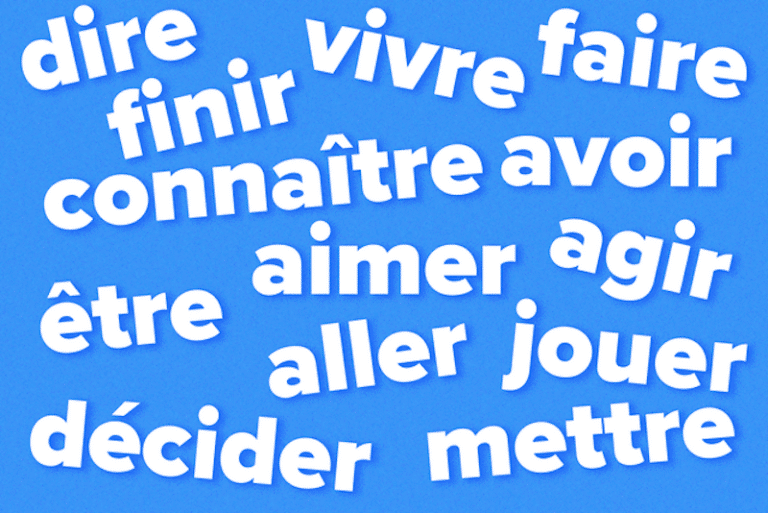160+ Useful French Cognates

There are plenty of essential vocabulary words that you can easily pick up, thanks to cognates. Cognates are words that have the same linguistic origin between two languages. Generally speaking, they look similar and have the same or similar meanings.
It’s no secret that languages often exchange words, but French and English take this to a new level with the sheer number of words they share. Here are 160+ French cognates, tips for recognizing more and some common false cognates to watch out for.
Download: This blog post is available as a convenient and portable PDF that you can take anywhere. Click here to get a copy. (Download)
Nouns
Many cognates are nouns, because names don’t depend on grammar, meaning languages can exchange these words easily. Take a look:
| French | English | French | English |
|---|---|---|---|
| Absence | Absence | Liberté | Liberty |
| Accident | Accident | Matériel | Material |
| Banane | Banana | Musique | Music |
| Ballet | Ballet | Nation | Nation |
| Calculatrice | Calculator | Objectif | Objective |
| Capital | Capital | Opéra | Opera |
| Débat | Debate | Opération | Operation |
| Décision | Decision | Pardon | Pardon |
| Différence | Difference | Passion | Passion |
| Édition | Edition | Peintre | Painter |
| Émotion | Emotion | Qualification | Qualification |
| Énergie | Energy | Qualité | Quality |
| Famille | Family | Question | Question |
| Festival | Festival | Raisin | Raisin |
| Génération | Generation | Révolution | Revolution |
| Grâce | Grace | Satisfaction | Satisfaction |
| Guitare | Guitar | Service | Service |
| Histoire | History | Transaction | Transaction |
| Horreur | Horror | Télévision | Television |
| Hôpital | Hospital | Uniforme | Uniform |
| Impression | Impression | Univers | Universe |
| Information | Information | Vacances | Vacation |
| Invitation | Invitation | Visiteur | Visitor |
| Journal | Journal | Vocabulaire | Vocabulary |
| Juin | June | Wagon | Wagon |
| Kilogramme | Kilogram | Xylophone | Xylophone |
| Kilomètre | Kilometer | Yaourt | Yogurt |
| Langue | Language | Zéro | Zero |
Adjectives
French and English also share many adjective cognates. Below is a list of some examples in their masculine forms:
| French | English | French | English |
|---|---|---|---|
| Absolu | Absolute | Légal | Legal |
| Acceptable | Acceptable | Logique | Logical |
| Basique | Basic | Magnifique | Magnificent |
| Britannique | British | Mental | Mental |
| Catholique | Catholic | Nerveux | Nervous |
| Clair | Clear | Naturel | Natural |
| Dangereux | Dangerous | Ordinaire | Ordinary |
| Dramatique | Dramatic | Original | Original |
| Électrique | Electric | Parlementaire | Parliamentary |
| Entier | Entire | Particulier | Particular |
| Fabuleux | Fabulous | Romantique | Romantic |
| Fréquent | Frequent | Régulier | Regular |
| Graduel | Gradual | Sensible | Sensible |
| Généreux | Generous | Sincère | Sincere |
| Horrible | Horrible | Traditionnel | Traditional |
| Illégal | Illegal | Transparent | Transparent |
| Immense | Immense | Urgent | Urgent |
| Important | Important | Vulnérable | Vulnerable |
| Kaki | Khaki | Xénophobe | Xenophobic |
Verbs
And here are some French verbs shared with English:
| French | English | French | English |
|---|---|---|---|
| Abandonner | To abandon | Limiter | To limit |
| Accepter | To accept | Mentionner | To mention |
| Bloquer | To block | Modifier | To modify |
| Capturer | To capture | Naviguer | To navigate |
| Célébrer | To celebrate | Noter | To note |
| Changer | To change | Observer | To observe |
| Communiquer | To communicate | Obtenir | To obtain |
| Détruire | To destroy | Posséder | To possess |
| Décider | To decide | Présenter | To present |
| Éditer | To edit | Qualifier | To qualify |
| Encourager | To encourage | Répondre | To respond |
| Établir | To establish | Réserver | To reserve |
| Étudier | To study | Résister | To resist |
| Fasciner | To fascinate | Toucher | To touch |
| Finir | To finish | Transformer | To transform |
| Gouverner | To govern | Unir | To unite |
| Harceler | To harass | Utiliser | To use |
| Identifier | To identify | Valider | To validate |
| Ignorer | To ignore | Varier | To vary |
| Justifier | To justify | Zoomer | To zoom in |
How to Recognize More French Cognates
Words in English that have certain endings are likely to have similar forms in French.
Here’s a list of common English word endings and a small sample of cognates for each. You can play the audio for the French and see the English word in parentheses.
| English Word Ending | Cognate Examples |
|---|---|
| -able | adorable (adorable), recyclable (recyclable) |
| -al | animal (animal), international (international) |
| -ance | ambulance (ambulance), importance (importance) |
| -ant | éléphant (elephant), restaurant (restaurant) |
| -ary | dictionnaire (dictionary), salaire (salary) |
| -ct | insecte (insect), respect (respect) |
| -ence | indépendance (independence), science (science) |
| -ent | adolescent (adolescent), paiement (payment) |
| -ible | visible (visible), possible (possible) |
| -ical | critique (critical), éthique (ethical) |
| -ion | prononciation (pronunciation), région (region) |
| -ist | artiste (artist), sexiste (sexist) |
| -ly | immédiatement (immediately), normalement (normally) |
Common False Cognates in French
20 Common French False Friends | FluentU French Blog
Learning French faux amis will help save you from any potential misunderstandings! There are so many frequently used French words that appear to be cognates but actually…
Be careful—not all familiar words are cognates!
Faux amis (false cognates or literally “false friends”) look the same as words in another language, but aren’t.
While I’ve given you some good tips for recognizing other French-English cognates above, you’ll want to be aware of faux amis and get into the habit of checking a dictionary when you see a familiar-looking word that you don’t know.
Not doing this and accidentally using a false friend will lead to a slight chuckle in most cases, but sometimes it can lead to very embarrassing situations!
I recommend memorizing the most common false cognates to get started:
| French | English |
|---|---|
| Actuellement | Presently (not actually) |
| Aimer | To like (not to aim) |
| Attendre | To wait (not to attend) |
| Blesser | To hurt (not to bless) |
| Bras | Arm (not bra) |
| Chair | Flesh (not chair) |
| Coin | Corner (not coin) |
| Déception | Disappointment (not deception) |
| Douche | Shower (not the medical device or an obnoxious person) |
| Éventuellement | Possibly (not eventually) |
| Habit | Article of clothing (not habit) |
| Journée | Day (not journey) |
| Librairie | Bookstore (not library) |
| Location | Rent (not location) |
| Pain | Bread (not pain) |
| Préservatif | Condom (not preserves or preservatives) |
The best way to get comfortable with these “unfriendly” words is to incorporate authentic French materials into your language studies. FluentU could help with this.
FluentU takes authentic videos—like music videos, movie trailers, news and inspiring talks—and turns them into personalized language learning lessons.
You can try FluentU for free for 2 weeks. Check out the website or download the iOS app or Android app.
P.S. Click here to take advantage of our current sale! (Expires at the end of this month.)
Why Do French and English Share So Many Cognates?
French and English share an amazing number of words. But why is this?
Here are the main reasons:
- Both are Indo-European languages. To get even more technical, French and English both trace their origins to an extinct proto-language spoken from roughly 4,500 to 2,500 BCE. And that’s exactly what cognates are—words in different languages with the same linguistic origin.
- French speakers invaded and dominated England for centuries. After the Norman invasion of 1066, French invaders replaced the English nobility and a plethora of words. For centuries, English-speaking servants served French-speaking masters. This is why many English words that predate 1066 have a French-derived synonym.
- England and France are neighbors. France is the closest mainland European country to England, separated only by a narrow channel. It’s no surprise that, even after the English nobility stopped speaking French, the two languages have continued influencing each other to the present day.
Today, English is the world’s lingua franca, and so many English words have been added to the French lexicon, including week-end, shopping, jogging, marketing and fast-food.
Although these words are considered franglais (a combination of French and English), they also meet the definition of cognates!
Cognates are tools that can help you learn French. But like any tool, you have to know how to use it properly.
Fortunately, thanks to cognates, the similarity of English and French vocabulary is one of the reasons why French is very accessible to English speakers.
So be wary of those faux amis and learn on!
Download: This blog post is available as a convenient and portable PDF that you can take anywhere. Click here to get a copy. (Download)
And One More Thing...
If you like learning French at your own pace and from the comfort of your device, I have to tell you about FluentU.
FluentU makes it easier (and way more fun) to learn French by making real content like movies and series accessible to learners. You can check out FluentU's curated video library, or bring our learning tools directly to Netflix or YouTube with the FluentU Chrome extension.
One of the features I find most helpful is the interactive captions—you can tap on any word to see its meaning, an image, pronunciation, and other examples from different contexts. It’s a great way to pick up French vocab without having to pause and look things up separately.
FluentU also helps reinforce what you’ve learned with personalized quizzes. You can swipe through extra examples and complete engaging exercises that adapt to your progress. You'll get extra practice with the words you find more challenging and even be reminded you when it’s time to review!
You can use FluentU on your computer, tablet, or phone with our app for Apple or Android devices. Click here to take advantage of our current sale! (Expires at the end of this month.)











